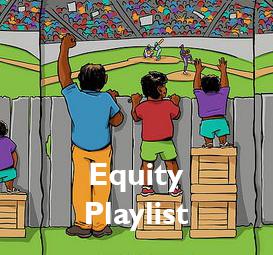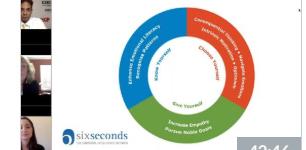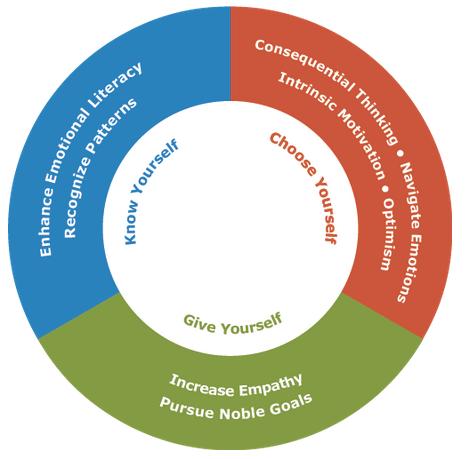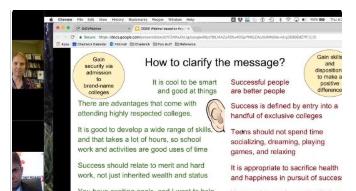
6 minute read
Questions of the Soul: Caring for the Whole Student, By The Rev. Tyler L. Montgomery, Chaplain and Assistant to the Headmaster for Student Wholeness, Woodberry Forest School (VA) may be directly connected to spirituality, even in “secular” schools. Caring for the whole child includes helping to overcome spiritual despair, a search for meaning in one’s life
Questions of the Soul: Caring for the Whole Student
Advertisement
When one of our students has anxiety or depression, the solutions that independent schools often provide are counseling/therapy, drugs, or a combination of the two. This is a reasonable response if our lead question is “How do we care for sick students?” What would change if we shifted our central line of questioning to “Why are so many more children getting sick?” or perhaps more important, “Why do we get sick at all?”

Material problems require material solutions. For example, the solution for strep throat is antibiotics. It is also true that immaterial problems require immaterial solutions. For example, the solution for loneliness is connection. The material and immaterial parts of our being are wrapped together in one dynamic bundle, so it would be foolhardy to separate them, however, there seems to be a universal human tendency to focus on material solutions to anxiety and depression at the expense of their immaterial components. In the common mind/body/spirit triptych of the independent school world, the spirit is often a distant third place. “to get into a ‘good’ college.” And why do they want that? “To get a good job,” they might respond. Why is that important? “I don’t know,” they might vacillate, “So that we can make money and be happy.” Try this for yourself to see where you end up.
The tragic majority of our students are
materialists who have drunk fully from the only glass of existential purpose that our overtly materialist society has placed to their lips: he or she who dies with the most stuff wins. What does it mean to be happy? Our independent school students largely believe that it means working hard to get into a selective college to work hard to get a good job so that they can work hard to earn enough money to send their children to an elite school like the one that they are currently attending. Welcome to the rat race. Be beautiful. Be powerful. Be rich. Be famous. That is the default religion of our society, and we are blind if we cannot see the power and ubiquity of that message radiating through the screens that are now attached to our students’ bodies. It is no wonder that our children are sick.
I am persuaded that the epidemic of anxiety and depression coursing through independent schools is primarily a crisis of the soul. When a student has anxiety or depression, we have become too reliant on drugs and therapy to “fix the problem,” and we have neglected the underlying and preponderant spiritual despair that is growing in our society. If you need evidence of this spiritual despair in secondary schools, try asking a group of students, “What are you looking for?” They will likely be stymied by the question, so press on with “Why are you here? Why are you at school?” An overwhelming body of data and anecdotal observations suggest that most students think that they are in school
www.oesisgroup.com At Woodberry Forest, our starting point for what we call the Wholeness Initiative has been connection. We believe that we are hardwired to connect, both to other people and to existential visions of meaning and purpose for the soul. We are trying to look critically at how to foster authentic connections between students and between students and teachers. We are introducing alternative learning experiences with the primary goal of building relationships around a campfire. At the same time, we are attempting to provide new avenues for students to engage with the big questions while strengthening the traditional sources of existential purpose like chapel and Bible class. We are investing a large
share of our professional development resources into “relational learning” with educational expert Michael Reichert because we believe that our students will learn best when they are connected to a meaningful relationship. We are trying to openly challenge materialism, using the chapel’s bully pulpit to expose the charade of college admissions and to offer an alternative in the example of Jesus. These are small steps, and we are far from perfect, but we hope that they will guide us back to a place that is grounded in spiritual health.
I attended a breakfast gathering a few years ago hosted by the provost of a “top-ten university” according to the great idol of U.S. News & World Report. He made the statement that, “X University is no longer in the business of teaching students what it means to live a good life, and, if we are being honest, neither are most universities. What we [i.e. selective universities] do is try to attract the best and the brightest students, give them almost unlimited resources, and let them figure it out for themselves.” If we accept this testimony, some of the great centers of learning in our republic have recused themselves from the most important questions of the human soul:
Who am I, and what is the purpose of my life?
Anxiety and depression abound when the human soul is starved of connection and a vision of existential purpose. What are we doing at independent schools to provide an alternative to the default materialism of our culture? Are we honest with ourselves about our own complicity in maintaining the narratives of elitism that benefit our institutions? Are we intentional about providing a counter-narrative to materialism that offers our students a vision of the good life that is not based on wealth, power, beauty, and fame? Do we make explicit, public claims as an institution about existential truths, or do we shy away from them for fear of those who might disagree with us? These are the kinds of questions that might lead schools towards a place that can feed a student’s soul. The questions that we ask determine the answers that we receive. It is time for independent schools to ask the big questions about our current anxiety and depression epidemic. Our souls are starving for them.
The Rev. Tyler L. Montgomery, Chaplain and Assistant to the Headmaster for Student Wholeness, Woodberry Forest School (VA), shared his existential approach to student wellness at OESIS Los Angeles 2019 and will keynote at OESIS Boston 2020 in October. __________________________________
SEL Trailers
Schools with successful SEL programs are safe, engaging and well-managed environments where children can focus on learning. Teaching SEL reduces violence and conflict while creating an atmosphere of trust, engagement, and curiosity.
Hot Cognition Teaser: SEL for Brain Engagement Cherilyn Leet, Assistant Director of Education, Six Seconds, Emotional Intelligence Network (CA) 4.53-minute trailer Six Seconds Frameworks & Contexts Around EQ, SEL, & Student Wellness Anabel Jensen, President, and Cherilyn Leet, Assistant Director of Education, Six Seconds, Emotional Intelligence Network (CA) 4.47-minute trailer





Wellness, Achievement and Assessment Deborah Dowling Associate Head for Academic Affairs Chadwick School (CA) 4.54-minute trailer









